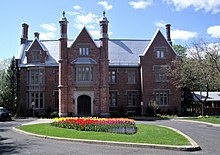Mont-Saint-Hilaire
Mont-Saint-Hilaire | |
|---|---|
| Mont-Saint-Hilaire | |
.jpg/250px-%c3%89glise_Saint-Hilaire_-_Mont-Saint-Hilaire_-_QC_-_CA_(3).jpg) | |
 Location within La Vallée-du-Richelieu RCM. | |
| Coordinates: 45°33′44″N 73°11′30″W / 45.56222°N 73.19167°W[1] | |
| Country | |
| Province | |
| Region | Montérégie |
| RCM | La Vallée-du-Richelieu |
| Constituted | March 12, 1966 |
| Government | |
| • Mayor | Marc-André Guertin |
| • Federal riding | Beloeil—Chambly |
| • Prov. riding | Borduas |
| Area | |
| • Total | 45.50 km2 (17.57 sq mi) |
| • Land | 44.08 km2 (17.02 sq mi) |
| Population (2021)[4] | |
| • Total | 18,859 |
| • Density | 427.8/km2 (1,108/sq mi) |
| • Pop 2016–2021 | |
| • Dwellings | 7,917 |
| Time zone | UTC−5 (EST) |
| • Summer (DST) | UTC−4 (EDT) |
| Postal code(s) | |
| Area code(s) | 450 and 579 |
| Highways | |
| Website | www |
Mont-Saint-Hilaire (French pronunciation: [mɔ̃ sɛ̃ nilɛʁ]) is a suburb of Montreal on the South Shore of southeastern Quebec, Canada, on the Richelieu River in the Regional County Municipality of La Vallée-du-Richelieu. The population as of the Canada 2021 Census was 18,859. The city is named after the Mont Saint-Hilaire.
A significant deposit of the semi-precious mineral sodalite is located near Mont-Saint-Hilaire.
History[edit]

Jean-Baptiste Hertel de Rouville was granted the seignory of the region in 1694.[5] By 1745 a mountain village had been formed with the first chapel being built in 1798 near the Richelieu River. Nearly twenty years later, in 1822, a ferry operating between Beloeil and Mont-Saint-Hilaire came into service. A bridge, enabling Beloeil and St. Hilaire to be connected by rail, was built in 1848 by the St. Lawrence and Atlantic Railway. The Campbell family, owners of the mountain after that of Rouville, sold the mountain to a British officer, Brigadier-General Andrew Gault, in whose ownership it remained for 45 years. Gault then bequeathed the mountain to McGill University before his death in 1958.
Demographics[edit]
In the 2021 Census of Population conducted by Statistics Canada, Mont-Saint-Hilaire had a population of 18,859 living in 7,766 of its 7,917 total private dwellings, a change of 1.5% from its 2016 population of 18,585. With a land area of 44.08 km2 (17.02 sq mi), it had a population density of 427.8/km2 (1,108.1/sq mi) in 2021.[6]
|
Population trend:[7]
|
Mother tongue language (2021)[8]
|
Attractions[edit]
-Hotel-de-Ville-2022-02-05.jpg/220px-Saint-Hilaire_(QC)-Hotel-de-Ville-2022-02-05.jpg)
- The Gault Nature Reserve on Mont Saint-Hilaire includes over a thousand hectares of primeval forest. Owned by McGill University, the nature reserve is used for research and recreation.
- The Museum of Fine Arts (Le Musée des beaux-arts) of Mont-Saint-Hilaire is the major art museum on the south shore of the Saint Lawrence River. It was founded in 1993 to promote the work of regional artists Jordi Bonet, Paul-Émile Borduas and Ozias Leduc.[9] Exhibitions also feature art from the area, such as Saint-Hilaire et les Automatistes in 1997, and Leduc, Borduas et le paysage de Saint-Hilaire in 2008, as well as other Quebec artists such as Jean-Paul Lemieux and Nancy Petry.[10]
- Art Station
- Art centre Ozias Leduc
- Manoir Rouville-Campbell
- Saint-Hilaire church
Infrastructure[edit]
Mont-Saint-Hilaire is served by the Mont-Saint-Hilaire commuter rail station on the Réseau de transport métropolitain's (RTM) Mont-Saint-Hilaire line. Local bus service is provided by the RTM's Vallée du Richelieu sector.
In 1864, Canada's worst rail disaster occurred here when a passenger train passed a red signal and fell off an open swing bridge into the Richelieu River, killing around 99 people.
Education[edit]

The town is home to 4 primary schools: Au-fil-de-l'eau (659 pupils), de l'Aquarelle (354 pupils) and de la Pommeraie (383 pupils) and Paul-Émile-Borduas. There are also 2 secondary schools, including Ozias-Leduc, with 1,480 students[11] and Collège Saint-Hilaire, a private high school that receives students from the region.[12]
The South Shore Protestant Regional School Board previously served the municipality.[13]
Notable people[edit]
- Louis Domingue, ice hockey player most recently for the Pittsburgh Penguins of the National Hockey League
- Laurent Duvernay-Tardif, American football player most recently for the New York Jets of the National Football League
-Cartier_r%c3%a9sidentiel_du_s/220px-Saint-Hilaire_(Qu%c3%a9bec)-Cartier_r%c3%a9sidentiel_du_secteur_de_la_gare-Rue_du_Grand_Tronc-2022-02-05.32db)
Photo gallery[edit]
-
Reception arch in front of the town hall of Saint-Hilaire
-
View of Mont Saint-Hilaire, the intersection of boulevard Honorius-Charbonneau and rue du Centre-Civique
-
Mont Saint-Hilaire (Quebec) seen from the train station parking lot in winter 2022.
-
Wayside cross in Mont-Saint-Hilaire (corner of Chemin des Patriotes and rue de Lisbonne)
See also[edit]
References[edit]
- ^ "Banque de noms de lieux du Québec: Reference number 42205". toponymie.gouv.qc.ca (in French). Commission de toponymie du Québec.
- ^ a b Ministère des Affaires municipales, des Régions et de l'Occupation du territoire: Mont-Saint-Hilaire
- ^ Parliament of Canada Federal Riding History: CHAMBLY—BORDUAS (Quebec)
- ^ a b 2021 Statistics Canada Census Profile: Mont-Saint-Hilaire, Quebec
- ^ Charlotte Gray 'The Museum Called Canada: 25 Rooms of Wonder' Random House, 2004
- ^ "Population and dwelling counts: Canada, provinces and territories, and census subdivisions (municipalities), Quebec". Statistics Canada. 9 February 2022. Retrieved 29 August 2022.
- ^ Statistics Canada: 1996, 2001, 2006, 2011, 2016, 2021 census
- ^ 2021 Statistics Canada Community Profile: Mont-Saint-Hilaire, Quebec
- ^ Le Musée des beaux-arts de Mont-Saint-Hilaire website
- ^ Le Musée des beaux-arts de Mont-Saint-Hilaire website
- ^ Public schools of Mont-Saint-Hilaire, CSP
- ^ Collège Saint-Hilaire
- ^ King, M.J. (Chairperson of the board). "South Shore Protestant Regional School Board" (St. Johns, PQ). The News and Eastern Townships Advocate. Volume 119, No. 5. Thursday December 16, 1965. p. 2. Retrieved from Google News on November 23, 2014.





